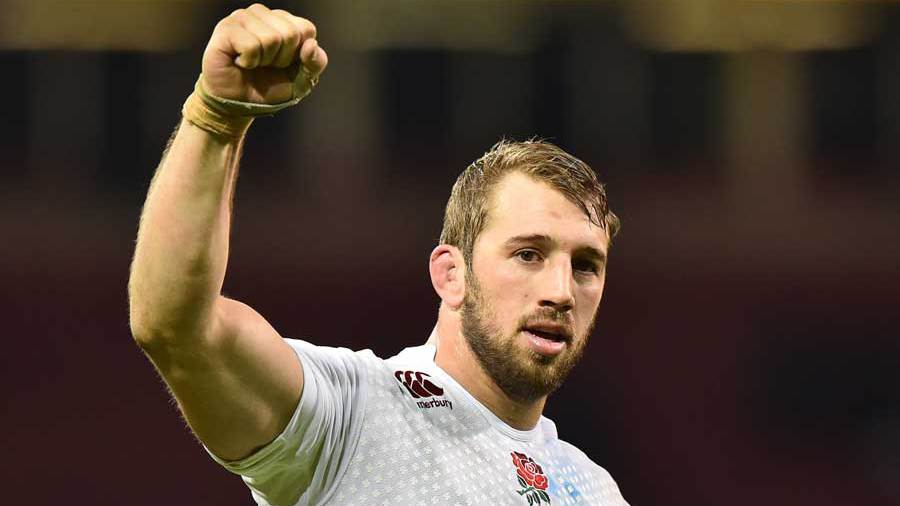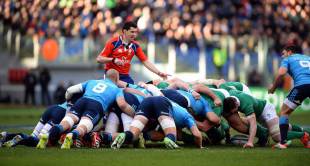|
Monday Maul
Time to ditch Friday night Six Nations games
Tom Hamilton, Tristan Barclay and Steven Saunders
February 9, 2015

Chris Robshaw had a 'Martin Johnson' moment against Wales © Getty Images
Enlarge
The first weekend of the Six Nations has been and gone with England, Ireland and France getting off to winning starts. Monday Maul assesses some key talking points from our correspondents at the matches.
The Friday evening nightmareWith the fixtures confirmed for the 2016 and 2017 Six Nations, Friday night games will unfortunately return as Wales host France next year and Ireland the year after. And if reports in the Daily Telegraph are anything to go by, expect Friday night matches at Twickenham before too long. They are a logistical nightmare for supporters and the problems witnessed as people battled to get on the final train out of Cardiff on Friday night made it clear they are an ill-judged feature of the Six Nations. The BBC may have enjoyed impressive viewing figures for Friday's match and the Cardiff pubs probably enjoyed a day of record takings but they offer little else to the championship. Hopefully, when the various stakeholders sit down to discuss the future of this great tournament, Friday night games will be consigned to some dark recesses of the boardroom. Tom Hamilton
Concussion debate back in the spotlightConcussion is never far from the rugby headlines and while huge strides have been made to improve player welfare and prevent the dangerous 'second-impact syndrome', the George North incident on Friday night [whem he appeared to be knocked out twice in the game] showed there is still work to do. World Rugby has asked for the Welsh Rugby Union to detail why North was allowed to stay on the field while the WRU has defended its treatment of the winger. There will no doubt be more to follow on this issue but North playing on after the second blow prompted criticism from various shocked players. Tom Hamilton
Cotter has Scotland playing the right wayStuart Hogg had warm words for head coach Vern Cotter in the post-mortem of Scotland's narrow loss to France on Saturday. The New Zealander, so Hogg claimed, has given the squad freedom to play attacking rugby, even if it results in the odd agonising defeat such as the one in Paris. "Vern wants us to play an exciting brand of rugby and I believe we've done that over the last wee while," Hogg said. "We had a good autumn and we're hoping to have a good Six Nations as well. It's very much, 'go out and enjoy your rugby, express yourselves'." Not only is it good news for Hogg - the fullback caught the eye with an excellent individual performance at the Stade de France - but it's good news for the fans. Scotland used to do a nice line in stylish backs and, while a return to the glory years of Townsend, Tait and co might be a way off, there's plenty to be excited about at Murrayfield. Tristan Barclay
Pitch imperfectThere was little to take from Ireland's victory over Italy in Rome that was meaningful for the various challenges ahead in a World Cup year. At least in a pure rugby sense, anyway. A few groundsmen in England might have been looking anxiously at the Stadio Olimpico pitch, however, and fearing what might befall them come early autumn on the international stage. As might a few football fans. Both AS Roma and Lazio play their home matches in Italian football at the Stadio Olimpico, with the pitch prepared for football's demands. In terms of sheer brute force, it is rarely exposed to anything quite like the rigours of Saturday's Six Nations game. A pre-match downpour did not help: numerous scrums had to be repositioned as the pitch gave way underneath the weight of each pack hunkering down and an embarrassing sand crater even opened up on the edge of the Italian 22 in the second-half. 
The Stadio Olimpico pitch struggled with the rugby
© Getty Images
Enlarge
A unique problem? Not quite, there is the small matter of the eight football stadiums being commandeered in England for Rugby World Cup matches in September and October. The pitches at Wembley, Brighton's Amex Stadium, the MK:Arena, Leicester's King Power Stadium, Villa Park, Elland Road, Manchester City's Etihad Stadium and St James' Park in Newcastle are all used primarily for football and will be expected to withstand the tremors of international rugby. As if to serve as an early warning, Wasps' move to the Ricoh Arena has prompted the relaying of that pitch, which was also only expected to host football matches until recently. It is easy to imagine much weeping and wailing about "egg-chasers" ruining things for the football masses, not to mention the - entirely reasonable - expectation that pitches should be up to the standard expected for international rugby. There will be a few sleepless nights ahead for beleaguered groundstaffs across England before mid-September. Steven Saunders
Scots Skipper carries the can in defeatIt is one of the harsh realities of international captaincy. When times are good, it's the skipper's face plastered all over the media celebrating victory. When times are bad, he's left to give the explanations. Scotland's Greig Laidlaw is not one for melodrama, but he had a face like thunder after defeat in Paris. While his team-mates are rightly entitled to talk of hopes for the long-term, the scrum-half insisted it was already time for victories to start flowing. "We're extremely frustrated," Laidlaw said. "We played a lot of really good rugby but then a little mistake here or there just let them off the hook. The players have already spoken about using this emotion to make a change for next week. We're playing at Murrayfield and we just want to get back there to make our bow in the Six Nations because this is just the start for this team." A little bit of aggression from a captain can go a long way. Just ask Chris Robshaw … Tristan Barclay
Robshaw stands firmFor all the pre-match shadow boxing, England made their first real statement when Robshaw stood his ground in the tunnel as the endless laser show continued on the Millennium Stadium turf. While Mike Brown was bouncing around like a ball of energy, Robshaw stood calm, Martin Johnson-esque, and waited for Wales to show in the tunnel. It was a sign of confidence and a seminal moment for him as an England captain. "We didn't want to go on the pitch 10 minutes before they came out, we didn't want to play tricks, we didn't want to play mind games," Robshaw said. "We wanted to have a bit of control. I am sure if we had gone out they would have made us wait in the cold for five minutes. We wanted to go out when they were ready as well. We didn't want to play sportsman's tricks." Tom Hamilton
Les Bleus become Les RougesFrance took to the field channelling more Welsh dragon than Gallic cockerel against Scotland on Saturday, swapping their famous blue shirts for a deeper shade of red. It's a colour they haven't worn for over 50 years, last doing so in a 1959 victory over … Scotland, of course. But how many red shirts could be spotted in the Stade de France crowd at kick-off? Exactly zero, according to ESPN Scrum's highly unscientific visual survey. Sponsors Adidas and the FFR will be hoping they don't have a Cardiff City on their hands. That football club's fans hated a kit switch from blue to red so much that they forced owner Vincent Tan to switch back again. Blue is the colour, as they say. Tristan Barclay © ESPN Sports Media Ltd
|
Live Sports
Communication error please reload the page.
-
Football
-
Cricket
-
Rugby
-
- Days
- Hrs
- Mins
- Secs
F1 - Abu Dhabi GP
Abu Dhabi Grand Prix December 11-131. Max Verstappen ()
2. Valtteri Bottas (Mercedes)
3. Lewis Hamilton (Mercedes)
4. Alexander Albon ()
5. Lando Norris ()
6. Carlos Sainz Jr ()
-
ESPNOtherLive >>
Boxing - Nelson v Wilson; Simmons v Dickinson; Joshua v Gavern (Metro Radio Arena, Newcastle)
Golf - Houston Open
Snooker - China Open
Tennis - Miami Open

